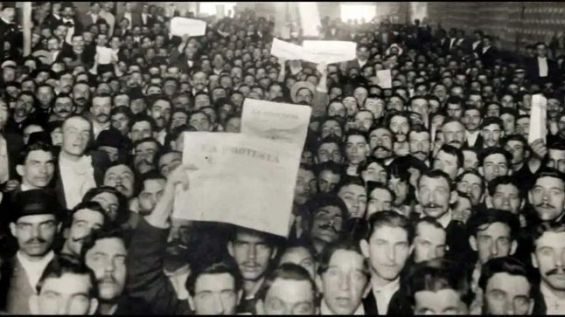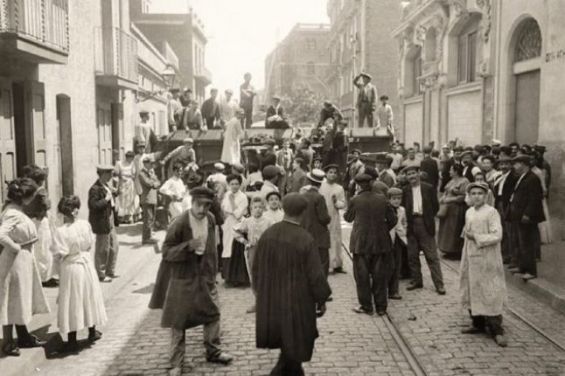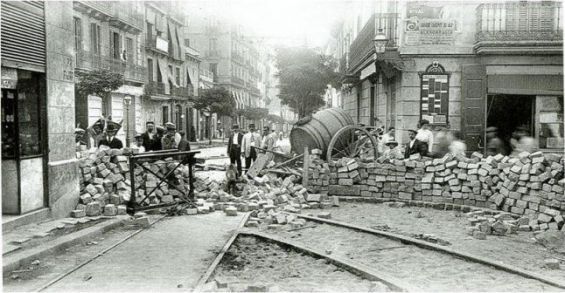Photos and videos of repressed Catalan voters have went viral starting from Sunday 1st of October, when 91,96 % of those who participated to the 2017 independence referendum said yes, an event that makes think of history. In fact, in 1909, Catalonia experienced similar riots when the Spanish army faced radicals of the working classes in Barcelona and other cities in Catalonia during the last week of July from the same year. The latter was called, the Tragic Week (July 26 to August 2nd, 1909), when the Spanish government killed, arrested, sentenced and exiled thousands of Catalans, who refused to participate to the Second Rif War in Morocco.
Spain and the Spanish-American war
In 1898, Spain fought the United States in a war known as La Guerra hispano-americana (the Spanish-American war) or Desastre del 98. Indeed the war was a real disaster for the Spanish who lost in Cuba, Puerto Rico, and Philippines their last colonies in the Pacific and the Atlantic oceans. Weakened by the war, Spain was determined to strengthen its presence in North Africa, and most precisely Morocco. By the end of the Ageciras conference, held between the 16th of January and 7th of April to find a solution to the first Moroccan Crisis of 1905, Spain and France had provisionally obtained the rights over Moroccan affairs.

On the 9th of July 1909, Spanish laborers working on the construction of the railway, which was destined to connect Melilla to the mines in Beni Bouifrour, were attacked by Rifians. In his article «The Spanish Contingent in Morocco through the archives of the Sevicio Historico Militar» (journal «Matériaux pour l’histoire de notre temps», volume 3, 1985), André Bachoud, a Spanish historian indicates that «in 1909, the attack that targeted the French-Spanish mines in the Rif triggered a series of military campaigns». These campaigns increased resulting in the «Rif War, a war that was initially not important due to the forces it engaged, but whose internal effects profoundly changed the Spanish political scene», he said.
«The order of mobilization launched in July 1909 by Maura’s government was badly received. The wounds caused by the Spanish-American were not healed. Since 1898, Spain has entered a new era of peace (…) and the public opinion was not prepared for the eventuality of another war. But more than that, what provoked a social unrest was the injustice of the military services».
The beginning of a tragic week in Catalonia
Indeed, to calm down the Rifian tribes near Melilla, Spain need soldiers that it did not have back then. It immediately called up reserve units in Catalonia by issuing a decree on the 11th of July 1909. A measure that was badly received by the Spanish population, especially Catalans, who mainly belong to the working class. As a result, a general strike was decided on the 2nd of August in Madrid while Barcelona was taken over by the «Solidaritat Catalana», a coalition of political parties in Catalonia formed after the 1905 incident and the approval of the 1906 Jurisdiction Act. Their objective was to protest against the decree and most precisely against the Spanish war in Morocco. The coalition called for a general strike on Monday 26th of July, which gave birth to the «Tragic Week». In Barcelona, as in several cities in the Catalan region, the strike was massively followed. The Spanish army took the streets but the day was peaceful.

On Tuesday, 27th of July 1909, things escalated in a deadly way. With the arrival of bad news from Morocco, insurrection was launched. In the vicinity of Melilla, and during the battle of Ravin-Aux-Loups, the Spanish troops were defeated by the Iqeriyens tribe. Nearly 1,200 reservists, mostly from the Catalan contingent who left Barcelona on the 18th of July, were killed.
According to Retro News, which shed light on the tragic event, reports that the social unrest in Catalonia was severely repressed.
«From July the 26th to August 2nd, 1909, blood was everywhere in Barcelona and in several provincial towns… The movement transformed into riots, martial law was proclaimed, barricades were installed and violent clashes with the army took place».
Murders, convictions and executions
On Wednesday of the same week, Catalonia was foggy, 18 churches and 49 convents or religious colleges were set on fire. Retro News featured a number of articles on the events. L’Aurore, a French newspaper created in 1944, wrote that «the People’s House was destroyed. All convents were burned except that of Calle Caspe, defended by the Jesuits and the Civil Guard. Ten thousand revolutionary armed fighters daily fought against the armed forces». La Libre, on the other hand, said that «Spain took revenge by strafing the revolutionaries in the streets of Barcelona», wrote the newspaper whose last issue dates back to June 1924.

Riots stopped on Friday and Saturday marking the end of one of the deadliest weeks in Spain. 2,000 people were arrested, 500 were wounded and nearly 100 died, as reported by Retro News. In his book «Diccionaro d’Historia de Catalunya, Barcelona», «Dictionary of the History of Catalonia, Barcelona», 62, 2004), Jesus Mestre I Campi states that Maura’s government, through its Interior Minister, Juan de la Cierva y Peñafiel, will start one of the most ferocious and arbitrary events on July the 31st. «175 people were exiled, 59 others were sentenced to death and 5 capital sentences. In addition, unions were banned and secular schools were closed», he reported. Five Catalans were sentenced to death on the 13th of October of the same year.
The war in Melilla was one of the major triggers of the Rif War. In 1924, Spain finally managed to defeat Rifians with the help of the French and the resident general Hubert Lyautey. In 1936, when General Francisco Franco wanted to conquest the Moroccan Rif, he did not rely on reservists, as the region was weakened by the economic crisis. Between 62,000 and 80,000 Moroccans were convinced to join Franco and fight in the Spanish Civil War.





 chargement...
chargement...













